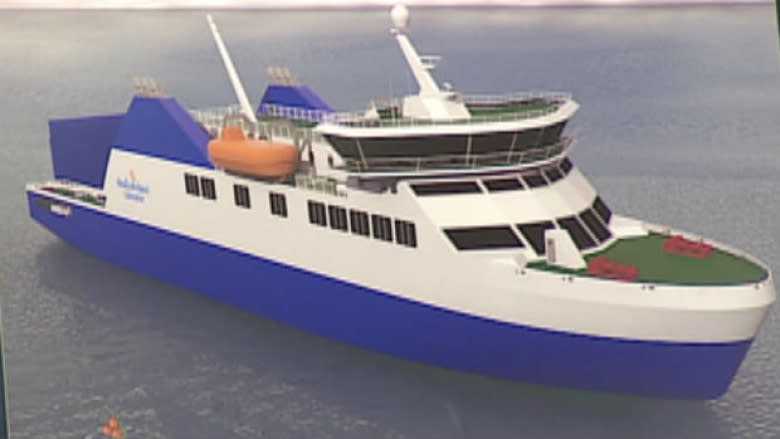Losing bidder questioned N.L. ferry contract decision
An unsuccessful bidder questioned whether taxpayers were getting the best value for the Bell Island and Fogo Island/Change Islands ferry replacement contract, citing the winner's lack of local experience and a $25-million extra tariff cost.
Chilean shipyard Asenav wrote then-transportation minister Nick McGrath last year, after the province announced the award of the contract to a Dutch company, Damen Shipyards.
CBC News obtained the correspondence through access to information.
Asenav noted that its bid was nearly the same as Damen's winning bid — just over $50 million per ship.
Damen is building the vessels at a yard in Romania. That means a 25-per-cent federal import tariff applies.
Chilean-built vessels are not subject to the tariff, thanks to a free trade agreement with Canada.
Asenav also stressed its experience building a number of "high-specification offshore vessels" for Maersk in the Newfoundland region — experience it says the winning bidder lacked.
"It is evident from the above facts that we are puzzled by the award decision, and would seek some clarification as to our perceived shortcomings, confirmation from you that the bidding process was full, clear and as per the RFP, and assurance that cabinet had all the pertinent information necessary to make the best decision for the taxpayers of the province," Eberhard Kossmann, Asenav's executive president, wrote on Jan. 20, 2014.
"From our perspective, the chosen shipyard has no experience building vessels for Newfoundland or Canada under Transport Canada, submitted a bid price for an identical vessel package that is going to cost the taxpayers of Newfoundland and Labrador an additional CDN 25.5 million dollars, and yet was the successful bidder."
Review launched after 1st letter
That initial letter sparked an exchange of correspondence between Asenav and the Department of Transportation and Works.
In a follow-up letter two weeks later, Asenav stressed the importance of the Canada-Chile free trade agreement in providing a "predictable commercial framework for business planning and investment," and asked for a meeting.
Brent Meade, the then-deputy minister, wrote back on Feb. 6, 2014, to advise that he had launched a "review of this matter" after receiving the initial correspondence.
Meade stressed that the government used the price including the tariff — more than $63 million per ship — when assessing the Damen bid.
"When this was done, it was determined that the best value to the province would be achieved by awarding this contract to Damen," Meade wrote.
Two weeks after that, Meade again stressed that the 25-per-cent import duty was factored into the government's decision-making process.
Meade wrote that the province had received "no assurance" that it could get the federal duty waived, and made its decision without any such assurance in place.
Cost not main factor in scoring 'matrix'
Transportation Minister David Brazil told CBC News that cost was not the main factor in the government's assessment of the bids. It amounted to 30 per cent of the overall "matrix" of how they were scored.
"We didn't go with the cheapest, we didn't go with the most expensive, we went with what was the best return on our investment for the taxpayers, and that was in the middle," Brazil said.
The minister said Damen still scored higher than Asenav, despite the extra $25-million tariff cost.
"Factoring in the tariffs in, or tariffs out, the Damen bid was a better fit for what we were looking for," Brazil said.
"It was based more on the technical ability for them to deliver a vessel — and the type of vessel, the type of horsepower it had, the capabilities that it had to maneuver in the waters that we have, the design of the vessel itself, their overall process around their ability to maintain their guarantees, and the warranty process."
Documents obtained through access to information show that Asenav hired a local lawyer, and a meeting was scheduled to discuss the issue with the province last spring.
Brazil, who was appointed to the transportation portfolio in September, said Asenav has had no contact with him since then, and he presumes the company is satisfied with the response from government officials.
Asenav did not respond to requests for comment sent to the company's head office in Chile.
Hope to have tariff waived
Last fall, Brazil said the province expects Ottawa to waive the $25-million tariff.
"We're confident we have a good argument there," he said in an interview at the time.
"There's a process. There's been no pushback from the feds."
Officials in Ottawa, however, noted they have only ever granted one such exemption — and that was largely because the ship in question was bought to replace another vessel that had actually sunk.




